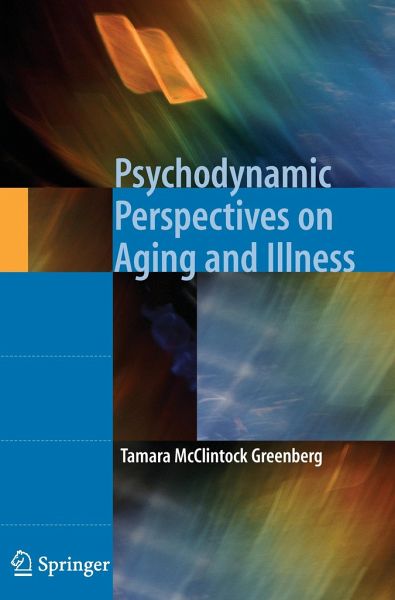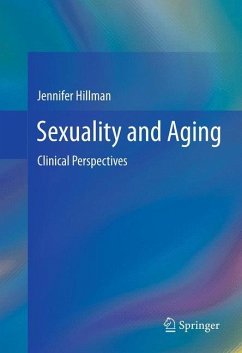contact with illness, suffering, pain, aging and death. With clearly elucidated concepts, vivid clinical examples and the benefit of her own personal narrative, the book is both compelling and educative. For those who work in medical settings, especially in health psychology and consultation liaison psychiatry, this text presents the definitive study of the nature of the experience of caring for sick people in our society. It will be required reading for a long time to come."
-
Marilyn S. Jacobs, Ph.D., ABPP, Assistant Clinical Professor of Psychiatry, David Geffen School of Medicine at UCLA Medical Center, Los Angeles"Dr. Tamra McClintock Greenberg, in her new book, Psychodynamic Perpectives on Aging and Illness ... presents keen insights for understanding your parents feelings and behaviors. The book is geared towards professionals who work with the 'aging population,' ... . After reading her book I thought you would find a session with Dr. Greenberg ... interesting. ... I will be sure to recommend your book to all the staff ... ." (The Huffington Post, October, 2009)
"Taking a more modern approach to the application of psychodynamic theories to aging and illness, this book emphasizes thetherapeutic relationship and current relational functioning. ... both experienced clinicians and patients may find this book helpful. ... graduate students in clinical/counseling psychology and social work also would find it helpful. ... This is a great book for clinicians who want to use psychodynamic theory with the elderly." (Gary B. Kaniuk, Doody's Review Service, June, 2010)
"This is a straightforward read, offered to present-day medical practi- tioners and mental health professionals to help with the art of treating older people. It examines this burgeoning population with a wide lens, taking in every feature, especially its impact on all the professionals pro- viding therapy: psychiatrists, psychologists, internists, and neurologists, as well as nurses, caseworkers, and personal caregivers. The author ad- dresses the technical and conceptual challenges, the major dynamics in these treatments, and the role of medical conditions...Psychodynamic Perspectives on Aging and Illness will provide the essential optimism, confidence, and technical proficiency needed for clinicians coping with referrals from the aging population." (Anna Burton, MD.,
The Psychoanalytic Quarterly, 2011)
"The purpose of Psychodynamic Perspectives on Aging and Illness is to highlight the need to better understand and apply psychodynamic theory and associated psychodynamic approaches to the treatment and care of older adults. The book argues that understanding aging-related reactions and sub- sequent adaptation issues needs a reconceptualization, shifting from a more "traditional" intervention approach to an approach grounded in psychoanalytic thought. The target audience for this book is practitioners caring for an aging population, geriatric clinicians, and anyone wishing to better understand personal reactions to aging. However, it is not necessary for the reader to have a background in psychoanalytic training to generally understand the ideas expressedin the chapters. Furthermore, the book is a useful guide for most individuals, both professionals and laypersons, interested in the interplay of the mind-body connection into later life.
The book has a good overall text structure, proceeding from psychodynamic foundation concepts to more advanced application issues. Overall, the book is very well written and logical in its progression of thought from chapter to chapter. Although each chapter is related to the preceding and proceeding chapters, the book is useful because each chapter can easily be read independently for reference purposes. In terms of writing style and ease of reading, the author achieves a good combination of technical and nontechnical writing usage for a wide audience interested in aging issues. The references cited at the end of each chapter reflect a range of both historical background and current thought in the field. The book is very timely in terms of understanding better approaches to addressing the adjustment needs of a growing aging population. Even though the text is very well written, it might benefit from the incorporation of more illustrative figures, tables, and appendix materials to further reinforce the text information.
The overall strength of Psychodynamic Perspectives on Aging and Illness is that it comes at a time when the quality of life of older adults is increasingly a concern, and it offers a compelling argument for an approach to reexamine this societal issue. In conclusion, the book is highly relevant and important to many areas of practice (and research). Only through this important examination of how we can better understand the "internal world" of aging can we hope to effectively create more positive quality-of-life outcomes for a growing segment of our population." (Lisa Hollis-Sawyer, Ph.D., Gerontology Program Coordinator Department of Psychology Northeastern Illinois University Chicago, IL)
"Greenberg does a superb job of covering alarge territory, while conveying empathy for her patients, and an understanding of the tremendous energy required for living with a compromised body. She delivers on her promise to bring together the two lenses of the medical and analytic fields in later life...One understandable result of this breadth is that in places, it leaves one wishing for more depth, and those of us working with seniors can continue to investigate, within our professional communities, the considerations that Greenburg puts forth. Her book may not assume readers (aside from those already "in the know") of the enjoyable aspects of elder psychotherapy, but perhaps that's to be expected. Treating aging and ailing people - who may not live long enough to experience the full benefit of long-term therapy and who stir up all kinds of existential anxities in their therapists - might be a hard sell, but it can be as absorbing and life-changing as any other kind of work." (Willow Banks, M.A., fort da (2014), 20 (2), 107-113)
















